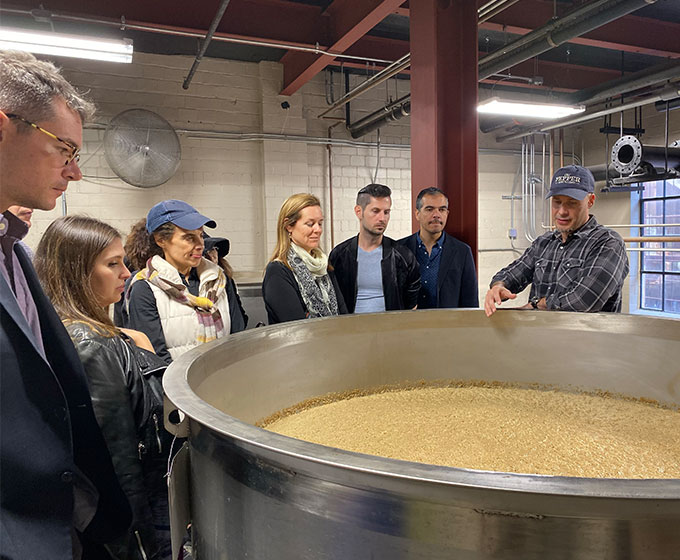
JUNE 23, 2022 — Researchers at the UTSA Institute for Economic Development today released “Economic Contributions of Distilled Spirits in Texas 2020,” a new study highlighting the significant economic impact Texas distillers made to their local communities and the state in 2020, despite economic hardships of the pandemic and lingering Prohibition-era laws restricting sales.
“Over the past decade, the number of Texas distilleries has grown dramatically as has the sector’s economic impact to local economies and surrounding communities,” Javier Oyakawa, lead investigator of the study from the Center for Community and Business Research at the UTSA Institute for Economic Development. “The number of Texas distilleries has grown from just eight in 2008 to 190 today. These distillers are playing a critical role in the state’s economy by generating sales, creating jobs, and providing wages and benefits.”
Key findings from the study show Texas distillers contributed:
“What we found especially interesting was that the Texas spirits industry continued to generate significant economic support for the state between 2019 and 2020, despite substantial declines in on-premise sales due to the pandemic-related closures of distillery tasting rooms and restaurants,” said Tom Tunstall, senior director for community and business research at the UTSA Institute for Economic Development.
The report was prepared for the Distilled Spirits Council of the United States.
“This study makes clear that continued growth of the Texas distilling industry presents great opportunities for the state, and that the collective economic contributions of these small businesses could be even greater if antiquated laws restricting spirits sales were updated,” said Kristi Brown, senior director of state government relations at the Distilled Spirits Council of the United States. “Texas distillers still aren’t allowed to sell spirits bottles to consumers on Sundays, despite being allowed to open their doors, offer tours and provide tastings.”
Brown added, “This simply doesn’t make sense. The decline in on-premise sales greatly impacted distillers, and it’s time to modernize Texas alcohol laws to help support this growing industry and spirits consumers throughout the state.”
TAX REVENUES FROM LOCALLY MADE SPIRITS
INDUSTRIES IMPACTED BY DISTILLER
The study also highlights the impact Texas distillers have on other local businesses. Aside from the distilleries, some of the top industries supported by the spirits industry are wholesalers of goods such as grains, machinery and equipment, glass container manufacturers and truck transportation.
Industries Impacted:
Total contributions in millions of dollars
|
$108.9 |
|
$44.4 |
|
$28.3 |
|
$28.2 |
“The data shows the proliferation of distilleries and their continued growth helps support other local businesses including farmers, glass manufacturers, truckers, equipment suppliers and more,” said Tunstall. “Supporting the distilling industry, therefore, has a much larger positive impact on the overall economy in Texas.”
Established in 1979, the IED is part of the UTSA Division of Research, Economic Development and Knowledge Enterprise. The institute is home to 10 centers and numerous programs that facilitate economic, community and business development at the local, regional and national levels.
UTSA Today is produced by University Communications and Marketing, the official news source of The University of Texas at San Antonio. Send your feedback to news@utsa.edu. Keep up-to-date on UTSA news by visiting UTSA Today. Connect with UTSA online at Facebook, Twitter, Youtube and Instagram.
Move In To COLFA is strongly recommended for new students in COLFA. It gives you the chance to learn about the Student Success Center, campus resources and meet new friends!
Academic Classroom: Lecture Hall (MH 2.01.10,) McKinney Humanities BldgWe invite you to join us for Birds Up! Downtown, an exciting welcome back event designed to connect students with the different departments at the Downtown Campus. Students will have the opportunity to learn about some of the departments on campus, gain access to different resources, and collect some giveaways!
Bill Miller PlazaJoin us for an intimate evening of cocktails, conversation, and culinary inspiration with Pati Jinich, Emmy-nominated chef and James Beard Award-winning author. Enjoy light bites and signature drinks in the warm, modern setting of Mezquite as Pati connects with guests over her passion for Mexican cuisine and storytelling.
Mezquite Restaurant in Pullman Market, 221 Newell Ave., San Antonio 78215From inspired courses to thoughtful pairings and a rich sense of community, the Ven a Comer Signature Dinner is a night of shared meals, shared stories, and unforgettable flavor.
Stable Hall (Pear Brewery), 307 Pearl Pkwy, San Antonio 78215Come and celebrate this year's homecoming at the Downtown Campus with food, games, giveaways, music, and more. We look forward to seeing your Roadrunner Spirit!
Bill Miller PlazaThe University of Texas at San Antonio is dedicated to the advancement of knowledge through research and discovery, teaching and learning, community engagement and public service. As an institution of access and excellence, UTSA embraces multicultural traditions and serves as a center for intellectual and creative resources as well as a catalyst for socioeconomic development and the commercialization of intellectual property - for Texas, the nation and the world.
To be a premier public research university, providing access to educational excellence and preparing citizen leaders for the global environment.
We encourage an environment of dialogue and discovery, where integrity, excellence, respect, collaboration and innovation are fostered.